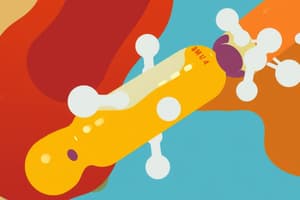Podcast
Questions and Answers
What does the term “antibiotics” mean?
What does the term “antibiotics” mean?
- Substances produced by some microorganisms and their synthetic analogues that inhibit the growth of organism cells
- Synthetic analogues of natural substances that kill protozoa and helminthes
- Non-organic or synthetic substances that selectively kill or inhibit the growth of other microorganisms
- Substances produced by some microorganisms and their synthetic analogues that selectively kill or inhibit the growth of another microorganisms (correct)
What are the general principles of anti-infective therapy?
What are the general principles of anti-infective therapy?
- Clinical judgment of microbiological factors
- Definitive identification of a bacterial infection and the microorganism’s susceptibility
- Optimal route of administration, dose, dosing frequency and duration of treatment (correct)
- All of the above
What is the minimal duration of antibacterial treatment usually?
What is the minimal duration of antibacterial treatment usually?
- Not less than 10-14 days (correct)
- Not less than 1 day
- Not less than 3 weeks
- Not less than 5 days
What is a rational anti-microbial combination?
What is a rational anti-microbial combination?
What is the definition of anti-infective therapy?
What is the definition of anti-infective therapy?
Flashcards are hidden until you start studying





